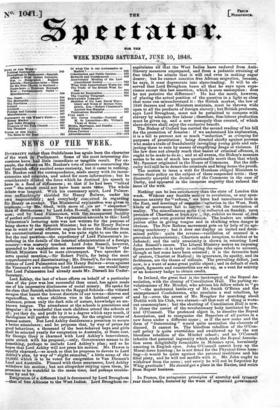NEWS OF THE WEEK.
DIVERSITY rather than fruitfulness has again been the character of the week in Parliament. Some of the most interesting dis- cussions have had little immediate or tangible result. For ex- ample, the debate on Mr. Bankes's vote of censure concerning the late Spanish affair excited some curiosity, but it came to nothing. Mr. Bankes read the correspondence, made merry with its incon- sistencies and asterisks, and asked for more information ; but he considerately diluted the force which he destined his speech to have in a flood of diffuseness ; so that if he had been "talked over" the attack could not have been more tame. The whole debate was languid. With his customary spirit, Lord Palmer- ston unflinchingly shielded Sir Henry Bulwer, under his own responsibility ; and everybody cow urred in regarding Sir Henry as exempt. The Ministerial explanation was given in triplicate,—by Mr. Shell, with more of Ais set " eloquence" than of distinctness ; by Lord John Bassett, with more distinct- ness; and by Lord Paiuierston, with the transparent lucidity of perfect self-possession. The explanation amounts to this: Lord Palmerston's lecturing note was not written for the purpose of being shown to the Spanish Minister ; but as Sir Henry Bulwer was in want of some effective engine to divert the Minister from his unconstitutional courses, he was quite right to use the note. But the real question—the expediency of Lord Palmerston's in- terfering in the details of the internal administration of a foreign country—was scarcely touched. Lord John Russell, however, appended to his explanation an assurance that "in future" the British Ministers will be more circumspect. Two speeches de- serve special mention,—Sir Robert Peel's, for being the most comprehensive and discriminating ; Mr. Disraeli's, for its energetic defence of Lord Palmerston and Sir Henry Bulwer—even against the Viscount's own colleague Lord Lansdowne: one would fancy that Lord Palmerston had already made Mr. Disraeli his Under- Secretary.
Lord Ashley, the last of whose efforts on behalf of a particular class of the poor was less successful than usual, has again made one of his impressive disclosures of social misery. He spoke for the class that furnish scholars to the Ragged Schools—the vitiated savages that haunt the lowest districts of our towns—thieves and ragamuffins, to whose children vice is the habitual aspect of existence, prison only the dark side of nature, knowledge an un- known tongue. The attendance at the schools is precarious and irregular : it is wonderful that such children attend the schools at all; yet they do, and profit by it to a degree which says much, if theologians will pardon the expression, for the original virtue of human nature. But Lord Ashley desiderates a premium to secure a better attendance; and he proposes that, by way of prizes for good behaviour, a thousand of the best-behaved boys and girls shall be selected yearly for emigration to Australia, at State cost. Sir George Grey is charmed with Lord Ashley's benevolence, quite struck with his proposal,—only, Government means to do something, perhaps to include Lord Ashley's plan ; and so he hopes that Lord Ashley will not press his motion. Mr. Hawes is equally charmed,—so much so that he proposes to devote to Lord Ashley's plan, by way of" slight stimulus," a little scrap of the 10,000/. which is to be voted for emigration to Van Dienien's Land and Australia. Pleased with these assurances, Lord Ashley Withdrew his motion ; but not altogether relying upon them, he promises to be watchful in the mean time, and perhaps trouble- some by and by.
Emigration of a different kind is denounced by Lord Brougham —that of free Africans to the West Indies. Lord Brougham re- capitulates all ttiat the West Indies have endured from Anti- Slavery measures unprepared, and from a pedantic straining of free trade : he admits that it will end even in making sugar dearer; but he cannot sanction free African migration, because, he says, it must degenerate into slave-trading. It will be ob- served that Lord Brougham bases all that he says upon expe- rience except this last assertion, which is pure assumption : does he not perceive the difference? He has the merit, however, of placing the actual position of the question in a light so clear that none can misunderstand it : the British market, the law of 1846 decrees and our Ministers maintain, must be thrown wide open to all the products of foreign slavery ; but British producers, says Lord Brougham, must not be permitted to compete with slavery by adequate free labour ; therefore, free-labour production must be given up, and a new monopoly thus created, of which slave-drivers shall enjoy the exclusive benefit.
The Bishop of Oxford has carried the second reading of his bill for the protection of females : if we understand his explanation, it is a bill to prevent not so much "seduction" as crimping for purposes of prostitution ; being directed chiefly against persons who make a trade of fraudulently inveigling young girls and sub- jecting them to ruin by means of stupifying drugs or violence. If the law does not already reach that basest of criminal offences, it ought to be made to do so ; and at all events, the Bishop's measure seems to be one of much less questionable merit than that which Mr. Spooner originated in the House of Commons. But the diffi- culty will still be to detect the criminals and bring home the proofs.
The motion to issue a writ for Horsham obliged Ministers to revise their policy on the subject of these suspended writs : they discreetly accepted the decision of the Commons in the case of Derby, and appeared in the immense majority that refused the issue of the writ.


























